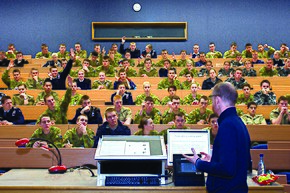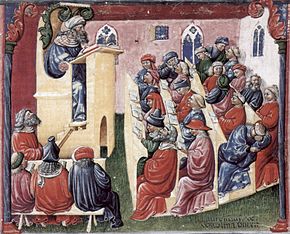
Back محاضرة Arabic Mühazirə Azerbaijani Лекция Bulgarian Classe magistral Catalan Přednáška Czech Darlith Welsh Foredrag Danish Vorlesung German Lekcio Esperanto Clase magistral Spanish



A lecture (from Latin: lectura 'reading') is an oral presentation intended to present information or teach people about a particular subject, for example by a university or college teacher. Lectures are used to convey critical information, history, background, theories, and equations. A politician's speech, a minister's sermon, or even a business person's sales presentation may be similar in form to a lecture. Usually the lecturer will stand at the front of the room and recite information relevant to the lecture's content.
Though lectures are much criticised as a teaching method, universities have not yet found practical alternative teaching methods for the large majority of their courses.[1] Critics point out that lecturing is mainly a one-way method of communication that does not involve significant audience participation but relies upon passive learning. Therefore, lecturing is often contrasted to active learning. Lectures delivered by talented speakers can be highly stimulating; at the very least, lectures have survived in academia as a quick, cheap, and efficient way of introducing large numbers of students to a particular field of study.
Lectures have a significant role outside the classroom, as well. Academic and scientific awards routinely include a lecture as part of the honor, and academic conferences often center on "keynote addresses", i.e., lectures. The public lecture has a long history in the sciences and in social movements. Union halls, for instance, historically have hosted numerous free and public lectures on a wide variety of matters. Similarly, churches, community centers, libraries, museums, and other organizations have hosted lectures in furtherance of their missions or their constituents' interests. Lectures represent a continuation of oral tradition in contrast to textual communication in books and other media. Lectures may be considered a type of grey literature.[2]
- ^ Cite error: The named reference
cirtlwas invoked but never defined (see the help page). - ^ "Grey Literature - GreySource, A Selection of Web-based Resources in Grey Literature". Archived from the original on 2016-06-03. Retrieved 2016-05-02. GreyNet International, Document Types in Grey Literature